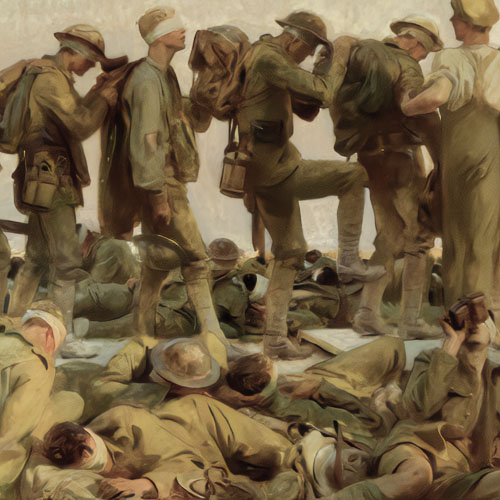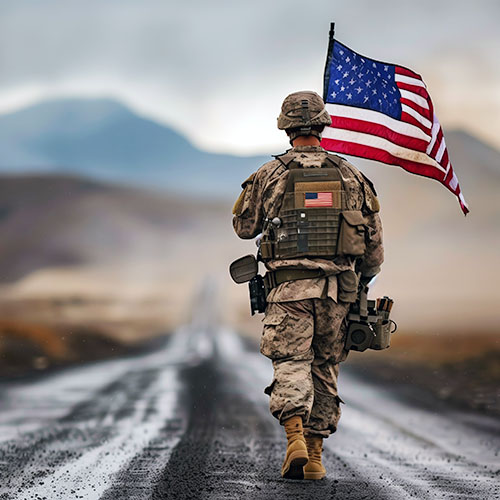Let’s talk brass tacks. The rub. The skinny. The straight dope. The benefits, yo.
Yes, the military’s an excellent place for young (and young-ish) hard-chargers and gung-hos to make a difference, to put their ideals into practice, to serve their nation, and, of course, to blow shit up with big-ass guns.
These are the usual reasons trotted out when people are asked why they joined up, and they are good reasons. Like many readers, I lived it, loved it, sometimes miss it, sometimes don’t, and know it’ll always be a fundamental part of who I am going forward.
I especially miss the blowing-shit-up-with-big-ass-guns part. There’s nothing in this world like letting a Mark 19 rip…
But there are other reasons servicemembers enlist. There are other reasons they stay in, too, past their initial contract. These aren’t hidden reasons, exactly. More like layered, subtextual reasons. The benefits: medical, financial, college, all that jazz. They matter, and they matter a lot.
2018 America seems hell-bent on returning workers to the labor underclass of the nineteenth century. At this rate, the American military might well be the last place where the word “pension” is a real goal and not a cruel joke.
The military is a bureaucracy, though, and like any bureaucracy, navigating it can be a maze. Many — too many — servicemembers and veterans don’t know what they’re entitled to and what they’ve earned through their service. Through my work and travels as a veteran-writer, and a few years working for a veterans’ national nonprofit organization, I can’t tell you how many times I’ve heard, “I wish I’d known about that earlier!” (often accompanied by a few F-bombs for effect).
So. What exact benefits did servicemembers and vets most appreciate? Which ones do they wish they’d learned about earlier? I asked some folks to share their wisdom.
Stephen, retired Master Sergeant, U.S. Air Force
“Without a doubt, the VA Home Loan. I don’t how I didn’t know about it earlier, but it was my wife who pointed me to it a year out [from retirement]. It was huge, letting us direct the money saved for our post-military home to funds for retirement and our kids’ college. And can I say the VA was pretty good to deal with for this? I know. I couldn’t believe it either.”
David, former Specialist, U.S. Army
“I didn’t know I qualified for VA medical health care. No one told me during TAP [transition assistance program]. I thought you had to do twenty years and get full retirement for it. I got out after four years. But because of our combat tour to Iraq, I do get VA medical. It’s not good but it’s better than the shit I had before. The mental health program at my VA has helped…. I still can’t believe no one at TAP told us this. Those two years [before finding out about qualifying for VA care] were fucking hard.”
I can’t tell you how many times I’ve heard, “I wish I’d known about that earlier!” (often accompanied by a few F-bombs for effect).
Kate, active Sergeant, U.S. Army National Guard
“This is probably an obvious one, but the post-9/11 G.I. Bill is amazing! I’ve been able to go back to school and have my books and housing all covered. It’s crazy to me that more of us [veterans] don’t use it. I know school’s not for everybody, but this is here. We earned it. Set yourself up for success. Though I have some friends who aren’t using it so they can save it for their kids, someday. That’s amazing they have that [transferability] option.”
Maria, former Major, U.S. Army
“Not sure this counts as a benefit exactly, but when I was a captain and thinking about getting out, DOD [Department of Defense] was offering cash bonuses to extend. $30,000 for four more years in my subject field [transportation]. I weighed the pros and cons with my family, of course, and ultimately decided to do it. It allowed me to keep serving, and when I ended up separating four years later, my résume was that much stronger for civilian employers.
“That’s something I think more young people should know when considering the military. It’s not all infantry and tanks. A lot of these career fields do transfer over to the civilian world. Mine did. Day one of my civilian job, I was 33 years old but had more experience and subject-matter knowledge than people ten years older, who’d been with this company for twenty years. It’s not just about patriotism. There are practical benefits, too, that help us as individuals, and help communities as a whole, from what we’ve learned and know.”
Glen, former Lance Corporal, U.S. Marine Corps
“You mean other than being a Marine the rest of my life? [Makes a woofing sound to signify his Devil Dog-ness] Free dental, I guess. They fixed my teeth. Not an easy fix. I looked gnarly before. Like a wombat or some shit. Now I got that straight-teeth shine.”
Terance, active Ensign, U.S. Navy
“I just joined the Navy myself, but I grew up a military brat. Both parents were in. I swore I’d never be like them…but after college, I was like, Now what? The job market out there is crazy. And my dad, he retired from the military — I’m looking at him, mid-forties, already on a second career, getting a retirement check every month. It’s a hard life, but it’s a good life. A fulfilling life. And my dad told me when I commissioned, be smart, work hard, and the Navy will look after you. No Fortune 500 Company does that. They may say it, but they don’t mean it. The Navy really means it.”
By no means are the benefits mentioned above comprehensive. I’d encourage any servicemembers, veterans, or family members reading this to look into what’s available to you or yours. Whatever it is, it’s been earned. Utilize it. Check out military.com/benefits and explore.va.gov for more information.























